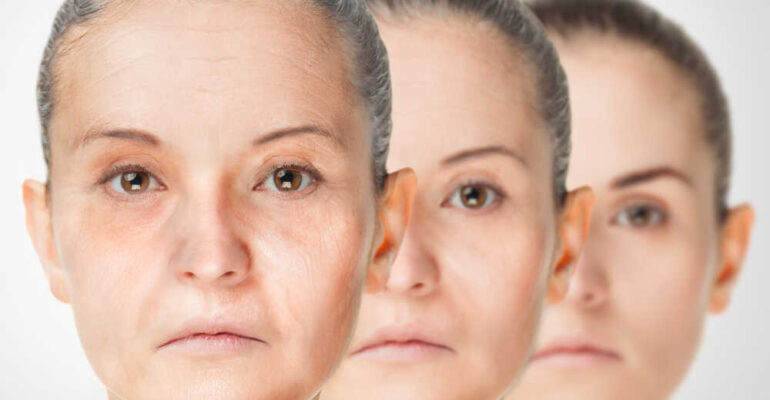4 steps Anti-Aging Skincare Regime
December 24, 2021 2025-04-23 3:524 steps Anti-Aging Skincare Regime
As an Amazon associate, Dermatocare earns from valid purchase made by clicking on the affiliate links in this blog.

4 steps Anti-Aging Skincare Regime
As a dermatologist and skin science communicator, one of the most frequent questions I encounter is: “Doctor, how can I erase wrinkles?” The truth is, once wrinkles have formed, their complete reversal typically requires aesthetic dermatological procedures such as Botox, Fillers, or LASERS. However, relying on anti-ageing creams alone to erase deep wrinkles is unrealistic.
That said, a targeted anti-ageing skincare regimen, combined with the right lifestyle and nutritional support, can significantly delay the onset of wrinkles and maintain youthful, radiant skin. Initiating this routine from the age of 25 can provide long-term benefits.
Why Do Wrinkles Form?
Wrinkles are a visible sign of dermal ageing—primarily caused by the depletion of collagen, elastin, hyaluronic acid, and glycosaminoglycans (GAGs). At a microscopic level:
- Collagen loss results in fine lines and reduced firmness.
- Elastin degradation leads to skin laxity and sagging.
- GAGs diminish, leading to a loss of hydration and suppleness.
- Hyaluronic acid declines in the upper layers, making the skin appear thinner and duller.
Three Core Goals of an Anti-Ageing Skincare Regime
1. Protect the Skin from Further Damage
Skin constantly battles oxidative stress due to UV radiation, pollution, stress, and poor diet. Topical antioxidants such as Vitamin C, E, Niacinamide (B3), and Glutathione neutralize free radicals, while broad-spectrum sunscreen protects against photoageing.
2. Rebuild Collagen and Elastin
Scientific evidence supports the role of the following active agents in restoring the skin’s structural proteins:
- Retinoids (Retinol, Retinaldehyde): Stimulate collagen and GAG production, accelerate cell turnover, and improve texture.
- Peptides (e.g., Palmitoyl Tetrapeptide-7, Matrixyl 3000): Enhance collagen synthesis and support dermal repair mechanisms.
3. Preserve Hydration, Tone, and Elasticity
Hydrating and tone-improving ingredients such as:
- Hyaluronic Acid: Binds water molecules, giving skin a plump, dewy appearance.
- Kojic Acid & Arbutin: Improve pigmentation and tone.
- Argan Oil & Ceramides: Restore the skin barrier and elasticity.
Do Anti-Wrinkle Creams Really Work?
Yes, when selected appropriately and used consistently. Clinical studies show that dermatologist-recommended formulations:
- Delay the onset of fine lines and deeper wrinkles.
- Improve skin texture and tone.
- Revitalize dull skin, especially in dry types with peptide and HA-based creams.
- Reduce oiliness and acne in oily types using retinoid-enriched formulations.
- Lighten dark spots with Vitamin C and Alpha Hydroxy Acids.
However, no topical product can replace volume or correct deep sagging—those require in-clinic procedures.
Can Diet Help in Preventing Wrinkles?
Absolutely. A lifestyle rich in antioxidant-rich foods, hydration, quality sleep, and regular physical activity reinforces skin health from within. I personally began my anti-ageing regimen at age 25, and at 42, I can attest to its efficacy. You may watch this video for a visual walkthrough: Skin Care Routine To Erase Wrinkles.
When Should You Start?
- Start by age 25: Preventative care provides long-term dividends.
- Mandatory by age 30: Skin turnover and repair slow significantly.
- Never too late: Even mature skin can benefit from a focused routine.
Morning Anti-Ageing Skincare Regimen
Step 1. Cleanser
The primary purpose of a face wash is to eliminate excess oil, dirt, dust, and pollutants. Do not expect a face wash to erase wrinkles or lighten dark spots, as the contact time with the skin is too short—typically under a minute.
How to choose the right face wash? It should be based on your skin type. Use the following guides to select a dermatologist-recommended option:
- Best face wash for dry skin
- Best face wash for combination or normal skin
- Best face wash for oily skin
Not sure what is your skin type? Click here!
Step 2: Ceramide-Based Moisturiser
Immediately after cleansing, apply a ceramide-based moisturiser. This step helps restore the skin barrier, especially in mature, dry, or sensitised skin, which often suffers from increased transepidermal water loss and reduced lipid content.
Ceramides are skin-identical lipids that support epidermal repair, hydration, and protection against environmental stressors. Using a ceramide-rich formula in the morning enhances the skin’s resilience and preps it for active ingredients applied afterward.
Step 3: Apply Vitamin C Serum
Next, apply a Vitamin C serum, one of the most potent topical antioxidants. It helps:
Impart radiance by enhancing collagen synthesis
Neutralize free radicals from UV rays, dust, and pollution
Lighten hyperpigmentation
Promote an even skin tone
Step 4: Apply Sunscreen
Sunscreen is non-negotiable in any anti-ageing routine. Use a broad-spectrum sunscreen that protects against both UVA and UVB rays.
- SPF 30: Sufficient for brief, casual exposure
- SPF 50: Required for prolonged or intense exposure
🕒 Apply sunscreen 30 minutes before sun exposure and reapply every 3 hours if outdoors. Use at least one teaspoon for the face and neck to ensure adequate coverage.
Step 5: Makeup
Apply makeup only after completing your skincare steps. Avoid excessive layering of products as this can:
- Clog pores
- Exacerbate texture irregularities
- Contribute to a dull, uneven skin appearance over time
Night Regime
Step 1: Remove Makeup Completely
Makeup residues can clog pores, trigger breakouts, and compromise the skin barrier. Use a gentle micellar water, or cleansing lotion to thoroughly eliminate all traces.
Step 2: Wash Your Face
Follow up with the same cleanser used in the morning to remove any remaining impurities.
Step 3: Ceramide-Based Moisturiser
Apply the same ceramide-based moisturiser used in the morning to rehydrate and strengthen the skin barrier overnight, preparing it for the more active ingredients in the next step.
Step 4: Anti-Ageing Night Cream
Your night cream should be chosen based on skin type and sensitivity:
- Retinoids (e.g., Retinol or Retinaldehyde): Ideal for normal to oily skin, they increase cell turnover and stimulate collagen.
- Peptides: Gentle and effective for dry or sensitive skin, promoting collagen repair and hydration.
Ideally, opt for anti-ageing night cream that includes:
- Antioxidants (e.g., Vitamin E, CoQ10)
- Exfoliants (e.g., AHAs, PHAs)
- Barrier-repairing agents like ceramide, HA
- Retinoids (skip if your skin is dry or sensitive)
- Peptides
Conclusion: Not Sure Where to Start?
Crafting an effective anti-ageing skincare routine can feel overwhelming with the multitude of products and ingredients available. If you’re unsure where to begin, let Dermatocare guide you.
Use our Dermatocare Product Review section to explore dermatologist-evaluated products tailored to your skin type and concerns. For a more personalised approach, try our Regime Builder Tool—designed by dermatologists to help you create a customised anti-ageing skincare routine that truly works for your skin.
ROUTINE FINDER
Get free dermatologist-recommended regime by choosing your skin or concerns.

FACE

HAIRS

CHILD

BODY




